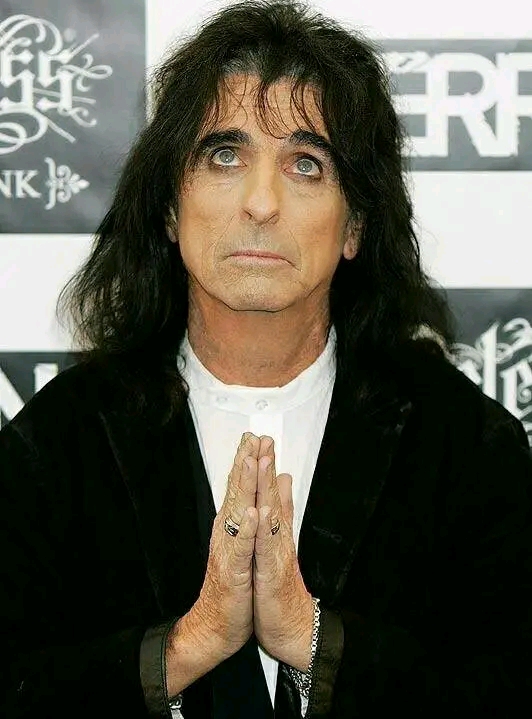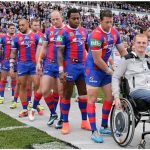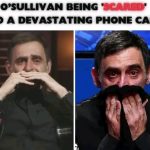**The Duet That Never Happened: A Fictional Reckoning of Rock’s Greatest “What If”**
In the chaotic, electric world of heavy metal, few names shine as brightly—or clash as thunderously—as *Ozzy Osbourne* and *that other icon*, the friend-rival whose very name evokes the primal scream of rock and roll. Call him *The Godfather of Shock*, *The Mirror in Black*, or simply the man who once shared the same stage, the same era, the same madness. Fans were breathless when Ozzy announced his “final” farewell event—an end-of-the-road blowout meant to close the curtain on decades of distortion, demons, and damaged eardrums. Everyone was talking about openers. The Crüe. Maiden. Sabbath alumni. But no one dared ask the question that echoed in silence:
**Where the hell was Alice Cooper?**
Yes. That Alice.
If you’ve followed metal long enough, you know the history isn’t just about the music—it’s about mythology. Ozzy and Alice didn’t just pioneer a sound. They conjured an entire aesthetic. Bats, guillotines, mascara, mayhem. They were two sides of the same black coin—Alice with his theatrical horror glam, and Ozzy, the Prince of F—ing Darkness. Both outcasts turned icons. Both survivors in a genre that eats its young. And somehow, *never quite together*.
When Sharon Osbourne made headlines for removing a band from the farewell roster—whispers pointed fingers: Mötley Crüe? Iron Maiden? Axl Rose and the ghost of Slash’s top hat? Conspiracies spiraled through message boards faster than a Randy Rhoads solo. But amidst the drama, no one asked the most important question:
**Why wasn’t Alice Cooper ever invited?**
Maybe people assumed he was. Maybe the idea seemed so obvious it didn’t need to be voiced. Because *of course* you’d call Alice. Of course, you’d give the godfathers their final waltz under blood-red lights, shrieking into each other’s arms like banshees resurrecting the ’70s. A duet of “I’m Eighteen” fading into “Crazy Train”—an entire generation of fans bawling into their beers. Grown men sobbing. Teens discovering what their parents were screaming about in the garage all those years ago.
It would have been biblical.
**But it never happened.**
Some say there was a phone call. That Sharon reached out, and Alice, ever the gentleman, bowed out, saying the show was Ozzy’s moment. Others say there was tension beneath the smiles, a decades-old rivalry dressed in mutual respect but simmering with backstage slights, missed calls, and the inevitable ego that comes with legend status.
Then again, maybe it was just forgotten.
Maybe the organizers got caught up in logistics, in contracts and reunions, and the “duet of destiny” got lost between lawyers and lighting grids. Maybe it was never meant to be.
But fans? We remember.
We remember the 1970s when Alice rose from Detroit with eyeliner and venom, while Ozzy broke through Birmingham’s soot like a gothic messiah. We remember their parallel ascents—each misunderstood, banned, beloved, and eventually canonized. We remember the rumors: Ozzy biting heads, Alice chopping his own off. Tabloids couldn’t keep up. Parents were terrified. Kids were baptized in distortion. These two weren’t just rock stars. They were high priests of rebellion.
And so, when Ozzy’s final show was announced—*his last stand*—fans didn’t just expect Alice. They *took it for granted*.
And when he didn’t show?
It hurt. Quietly. Deeply. Like watching Gandalf retire without Elrond showing up. Like Batman hanging up the cape without Joker lurking in the shadows. There was a sacred symmetry missing.
Just imagine it:
The stage goes black. A single spotlight.
Alice Cooper struts out in full regalia—top hat, snake, the whole damn haunted mansion. The crowd erupts. And then, from the side, Ozzy shuffles out, wild-eyed and grinning like a devil with a secret. Guitars wail. Drums thunder. And the two titans lock eyes, nod, and unleash chaos.
A mashup of “School’s Out” and “Bark at the Moon.” A spoken-word intro from Alice, drifting into the trembling opening of “Mr. Crowley.” The theatrics. The camaraderie. The shared *legacy*.
They wouldn’t even need to say anything. The music would do it all.
But it didn’t happen.
Instead, there was silence where there should’ve been a scream.
Some fans have made peace with it. Others cling to hope: maybe there’s still time. Maybe another gig, another collaboration, another reunion show in the afterlife of rock legends.
But even if it never happens, it should have. And that’s the haunting beauty of it.
In an alternate timeline, Ozzy and Alice walk off that final stage together, hands raised, feedback howling like a beast that refuses to die. Fans sob. Lights fade. And rock, as we knew it, ends—not with a whimper, but with a war cry echoing across generations.
But this is *our* timeline.
And in our timeline, Alice Cooper never got the call.
And that, friends, is the real tragedy of Ozzy’s last ride.
Want to turn this into a dramatic monologue, mock interview with Sharon, or even
a magazine-style op-ed? I can help shape it into any form you like.









